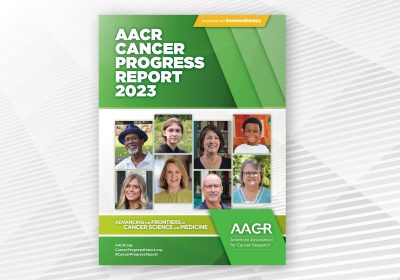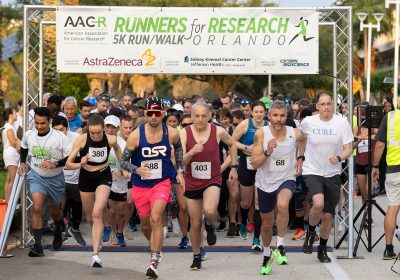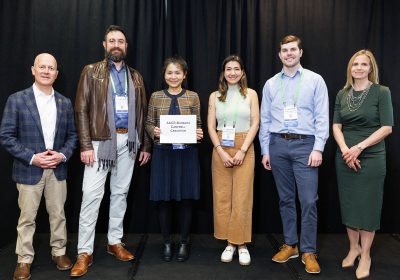AACR Grants and Awards
An Inspirational Lab Visit
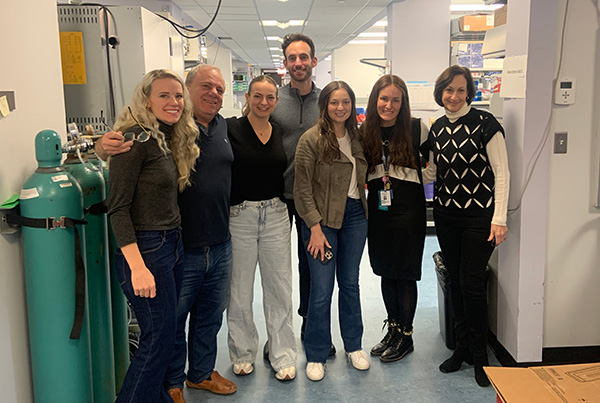
When Evan Horn’s sister, Darcy, was diagnosed in February 2022 with Ewing sarcoma, a rare cancer that forms in the bones and soft tissue, he rallied friends and family members to join the AACR Runners for Research for the 2022 Philadelphia Marathon Weekend. With more than 90 runners and countless more supporters, the D-Team raised nearly $100,000 for the AACR, which was divided into two separate cancer research grants to leading scientists in the field.
In April 2023, Rachel Offenbacher, MD, received one of the fellowships in sarcoma research funded by the D-Team’s efforts. “Knowing that a small group of family and friends raised funds for this work because of a loved one means so much to me,” said Dr. Offenbacher, a pediatric hematologist-oncologist at Albert Einstein College of Medicine and the Children’s Hospital at Montefiore in New York City. With D-Team support, Dr. Offenbacher was able to begin her research a year earlier than expected. She invited the Horn family to join her on a tour of the lab of David M. Loeb, MD, PhD, division chief of pediatric hematology, oncology, and cellular therapy at the Children’s Hospital at Montefiore, where she conducts her research.
Working alongside Dr. Loeb, Dr. Offenbacher researches how chemotherapy might allow cancer cells to spread and cause distant metastases. They have demonstrated that in Ewing sarcoma patients, chemotherapy can increase the number of entry points or “doorways” where cancer cells in the tumor microenvironment can enter the bloodstream, which can be devastating. Together, they are working to reduce these entry points and improve treatment efficacy for their patients.
The Horn family was moved by Dr. Offenbacher’s deep knowledge, sense of care, and the promising research they had helped make possible. “It was really meaningful and gratifying to see our efforts in action,” said Evan. The lab visit has only strengthened the Horn family’s partnership with the AACR.
Dr. Offenbacher is grateful to have met the Horn family. “I chose a career in pediatric oncology and translational research to help push the envelope in what we do for our patients,” she said. “As I shared with the family, Darcy is one of the reasons I do this work and the reason we celebrate our scientific advances.”
Building a Cancer Research Infrastructure in Africa
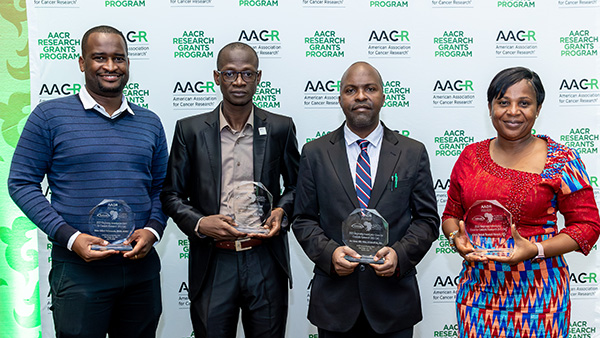
In 2010, the National Cancer Institute Center for Global Health, in partnership with the African Organization for Research and Training in Cancer (AORTIC), launched the Beginning Investigator Grant for Catalytic Research (BIG Cat) grants initiative. In 2022, the American Association for Cancer Research® (AACR) provided grants administration for this project aimed at reducing the burden of cancer in Africa. By offering two-year grants, the goal is to catalyze locally relevant cancer research and to facilitate career advancement and development of research capacity in Africa.
Historically, the pool of cancer researchers in Africa has been limited, in part because early-career funding mechanisms to help launch junior investigators into research careers are very limited. With this new pipeline, the next generation of researchers has the resources to gather local evidence and knowledge upon which clinical public health and policy guidelines can be built. These include researchers like 2022 BIG Cat grantees Leonardo Alves De Souza, PhD, University of Cape Town, Adwoa Bemah Boamah Mensah, PhD, Kwame Nkrumah University of Science and Technology, Abram Kamiza, PhD, University of Witwatersrand, and Imran O. Morhason-Bello, MD, PhD, University of Ibadan.
The AACR welcomed the second BIG Cat program cohort to the AACR Annual Meeting 2024 in April as they embarked on innovative projects that span the cancer continuum and form a basis for reducing the burden of cancer in Africa. With program support, Katherine Rae Antel, MD, PhD, a hematologist at the University of Cape Town in South Africa, is investigating the potential of liquid biopsies to bypass the limited access to specialized pathology services and lymph node biopsies available in sub-Saharan Africa.
For Alex Mremi, DDS, MMed, PhD, head of the pathology department at Kilimanjaro Christian Medical Centre in Moshi, Tanzania, the award will allow him to consider an alternate route to diagnose esophageal squamous cell carcinoma in East Africa. Dr. Mremi will administer Cytosponge—an innovative “pill on a string” diagnostic method that is less invasive and less expensive than endoscopy—to 500 high-risk individuals in Tanzania and assess how the procedure is tolerated. In addition, he plans to research endoscopy and Cytosponge outcomes, explore lifestyle and environmental determinants, and build a Cytosponge bank that can be used to identify biomarkers and to conduct molecular studies.
Other researchers who will benefit from BIG Cat grants are clinician-scientist Brehima Diakite, MD, PhD, of the University of Bamako in Mali, who is investigating personalized therapeutic approaches to breast cancer in Mali, and Rizine Robert Mzikamanda, MBBS, MMed, a pediatric hematologist-oncologist at Texas Children’s Hospital – HOPE in Lilongwe, Malawi, who is researching the biology of acute leukemia in children of sub-Saharan Africa.
Related Posts
